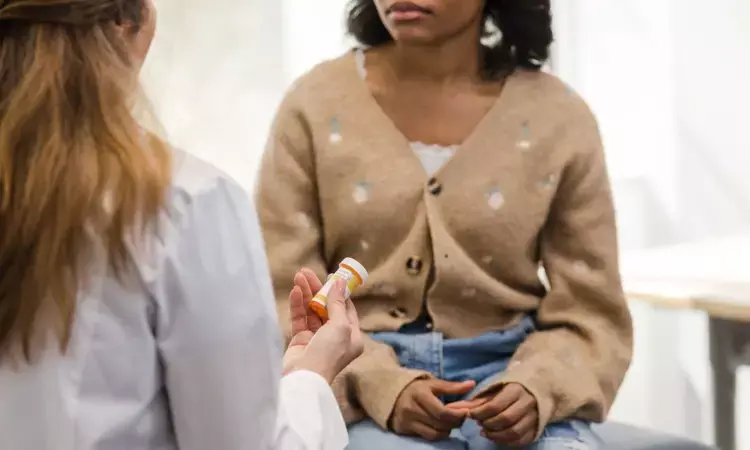- Home
- Medical news & Guidelines
- Anesthesiology
- Cardiology and CTVS
- Critical Care
- Dentistry
- Dermatology
- Diabetes and Endocrinology
- ENT
- Gastroenterology
- Medicine
- Nephrology
- Neurology
- Obstretics-Gynaecology
- Oncology
- Ophthalmology
- Orthopaedics
- Pediatrics-Neonatology
- Psychiatry
- Pulmonology
- Radiology
- Surgery
- Urology
- Laboratory Medicine
- Diet
- Nursing
- Paramedical
- Physiotherapy
- Health news
- Fact Check
- Bone Health Fact Check
- Brain Health Fact Check
- Cancer Related Fact Check
- Child Care Fact Check
- Dental and oral health fact check
- Diabetes and metabolic health fact check
- Diet and Nutrition Fact Check
- Eye and ENT Care Fact Check
- Fitness fact check
- Gut health fact check
- Heart health fact check
- Kidney health fact check
- Medical education fact check
- Men's health fact check
- Respiratory fact check
- Skin and hair care fact check
- Vaccine and Immunization fact check
- Women's health fact check
- AYUSH
- State News
- Andaman and Nicobar Islands
- Andhra Pradesh
- Arunachal Pradesh
- Assam
- Bihar
- Chandigarh
- Chattisgarh
- Dadra and Nagar Haveli
- Daman and Diu
- Delhi
- Goa
- Gujarat
- Haryana
- Himachal Pradesh
- Jammu & Kashmir
- Jharkhand
- Karnataka
- Kerala
- Ladakh
- Lakshadweep
- Madhya Pradesh
- Maharashtra
- Manipur
- Meghalaya
- Mizoram
- Nagaland
- Odisha
- Puducherry
- Punjab
- Rajasthan
- Sikkim
- Tamil Nadu
- Telangana
- Tripura
- Uttar Pradesh
- Uttrakhand
- West Bengal
- Medical Education
- Industry
Decline in Antidepressant Use During Pregnancy Raises Mental Health Concerns: JAMA

Canada: A recent cohort study published in JAMA Network Open has revealed a notable decline in antidepressant use during pregnancy, with no corresponding increase in psychotherapy. Given the mental health challenges women face during and after pregnancy, these findings emphasize the need for enhanced dialogue between pregnant women and their healthcare providers about available mental health treatment options.
The researchers note that women face the highest lifetime risk of depression during and after pregnancy, especially those with a history of depression. Deciding whether to continue antidepressants can be challenging, as there are concerns about the safety of in-utero exposure to some medications. However, untreated maternal depression can lead to severe long-term consequences for both mother and child. For those discontinuing antidepressants, guidelines recommend psychotherapy, highlighting the crucial role clinicians play in guiding informed mental health decisions during pregnancy.
Against the above background, Claire Boone, Department of Economics, McGill University, Montreal, Quebec, Canada, and colleagues offer detailed evidence on the treatment choices made by women and their clinicians regarding depression during pregnancy.
The cohort study adhered to the STROBE reporting guideline and was classified as not involving human participants by the University of Chicago Institutional Review Board. Analyses were performed from January to November 2024 using Merative MarketScan Research Databases, which provide claims data for a large sample of privately insured individuals in the U.S. The study focused on women who gave birth between 2011 and 2017, with prescription drug coverage before, during, and after childbirth. Antidepressant medication fills, and psychotherapy claims for women and their spouses were analyzed over two years.
Key Findings:
- The study included 385,731 women, with a mean age of 31.8 years, 74.8% of whom were employed, and an average income of $84,577.
- 4.3% of women filled an antidepressant prescription before pregnancy, and 2.2% during pregnancy, reflecting a 48.8% decrease.
- No similar decrease was seen in antidepressant use among 217,877 spouses.
- Women did not substitute antidepressants with psychotherapy; in fact, psychotherapy claims slightly decreased during pregnancy.
- Within one month after childbirth, women resumed antidepressant use, but restarting treatment post-pregnancy may leave many women untreated during the high-risk postnatal period.
The findings revealed a significant reduction in antidepressant use during pregnancy, without a corresponding increase in psychotherapy. These findings highlight the importance of addressing mental health treatment options during pregnancy, considering the challenges women face before and after childbirth.
"However, the study has limitations, including the reliance on prescription refills rather than medication adherence, which may not fully capture treatment patterns. Additionally, the absence of survey data prevents further exploration of why women discontinue medication. Finally, the study's focus on privately insured individuals in the U.S. means the results may not apply to broader populations," the researchers concluded.
Reference:
Boone C, Colina C, Pope D. Antidepressant Use Before, During, and After Pregnancy. JAMA Netw Open. 2025;8(1):e2457324. doi:10.1001/jamanetworkopen.2024.57324
Dr Kamal Kant Kohli-MBBS, DTCD- a chest specialist with more than 30 years of practice and a flair for writing clinical articles, Dr Kamal Kant Kohli joined Medical Dialogues as a Chief Editor of Medical News. Besides writing articles, as an editor, he proofreads and verifies all the medical content published on Medical Dialogues including those coming from journals, studies,medical conferences,guidelines etc. Email: drkohli@medicaldialogues.in. Contact no. 011-43720751


